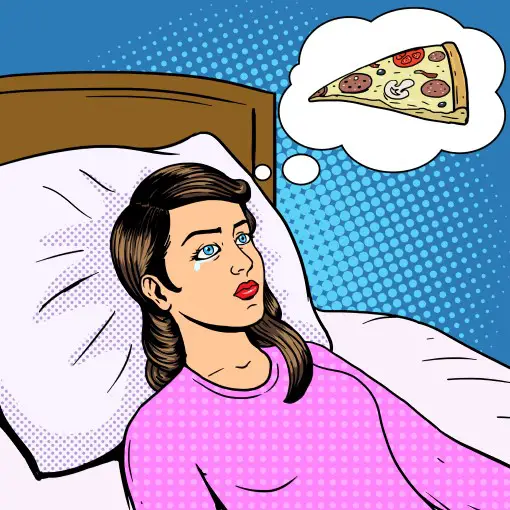
Too hungry to sleep? – 12 Sleep friendly snacks and how to stay out of trouble
By Jason Wooden, PhD | December 17, 2020
If you’re too hungry to sleep, doing the wrong thing can make a bad situation worse. Some foods and night time activities can make it harder to transition to sleep.
It’s important to snack on sleep-friendly foods and make lifestyle changes to avoid night time hunger. It’s also worth seeing a doctor to check for other underlying issues that may be causing or worsening your sleep issues.
The surprising ways night time hunger makes it hard to sleep
We’ve all been there at one point, too hungry to sleep, frustrated, and wondering what to do.
Laying in bed wide awake with a growling stomach yet desperate for sleep can be a real downer.
Waking up hungry in the middle of the night can be just as bad.
Every night 1 in 3 adults worldwide struggle with sleep. Your guess is as good as mine as far as how many people fight insomnia because of hunger.
Nonetheless, if it’s happening to you, the only stat that matters is you.
There are all sorts of reasons you may find yourself in this situation.
Maybe you skimped on dinner because you were too busy or didn’t have the energy. Perhaps, you were dieting or lately you just don’t feel like eating.
Regardless of how you got there, it’s all the same for your sleep.
An aching stomach can be a distraction hard to ignore that keeps you from relaxing and drifting off to sleep. As frustration grows, it can really rachet up the stress and anxiety which are known enemies of sleep.
The mood swings some people may go through when their blood sugar drops can leave them grumpy or feeling down which is also bad for sleep. (Yes, depression is also linked to insomnia.)
And then there’s the hunger-depression cycle where you don’t eat because of lack of interest which worsens your mood and sleep. Lastly, let’s not forget how poor sleep and depression can play off each other.
So, whether your night time hunger is an occasional issue or seems to be happening more often, you really need to do something about it given how much is at stake when it comes to sleep.
Yet, you don’t want to do the wrong thing – that can put you even more behind the sleep eight ball.
Let’s take a look at you need to avoid, some sleep-friendly snacks that may help, and what you really should be doing to stay out of trouble.
Activities to avoid when you’re too hungry to sleep
It’s pretty obvious that doing the wrong thing can make a bad situation worse, right?
Whatever you do should make it easier fall asleep and stay asleep. Unfortunately, so many people make the same mistakes when fighting insomnia.
If you find yourself too hungry to sleep, doing the wrong thing can make it HARDER to fall back to sleep.
You may be tempted to do something to distract yourself. Stay away from any activities that may get you more wired up and keep you up even later.
Some things that may make it harder for you to relax and transition to sleep include:
Reading a page turner – it’s hard to put the book down
Watching TV – the bright screen tells your brain to stay awake
Social media – another bright screen and it’s hard to unplug
YouTube – bright screen and it’s too easy to go down a rabbit hole
Foods to avoid when you’re too hungry to sleep
Eating the wrong thing because you’re too hungry to sleep can make a bad situation worse.
Some foods are just bad for sleep. They can make it harder to fall asleep or can come back to bite you during the night.
What you eat in evening can wreck your sleep in various ways:
Digestive issues – Heartburn, food intolerance triggering acid reflux, diarrhea, migraine headaches, and nausea can make it harder to fall asleep.
Natural stimulants – Foods containing caffeine can make it harder to fall sleep.
Non restful sleep – Some foods may rouse you out of deep sleep
Anxiety – Anxiety can make it harder to fall asleep. Alcohol can change the levels of the feel-good chemical serotonin and neurotransmitters in the brain. Caffeine can also trigger anxiety, but may also affect the levels of the serotonin. Sugar can be a trigger for anxiety for some people.
Here are some foods you should avoid in evening:
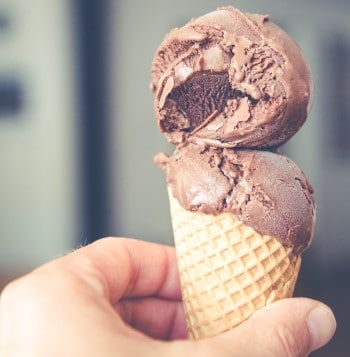
Caffeinated foods
Hot cocoa, chocolate cake, dark chocolate bars, coffee-flavored, or dark chocolate ice cream.
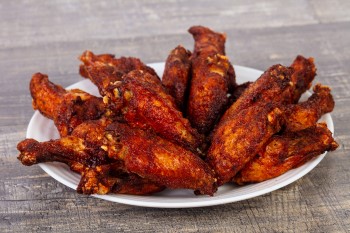
Spicy foods
Well-known for causing heartburn, indigestion, and acid reflux.
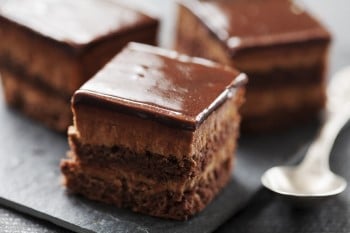
Refined carbs
Sugar and other refined grains can spike your blood with sugar, causing energy levels to be out of sync. Would you believe that sugar consumed during the day can pull you out of deep sleep during night?
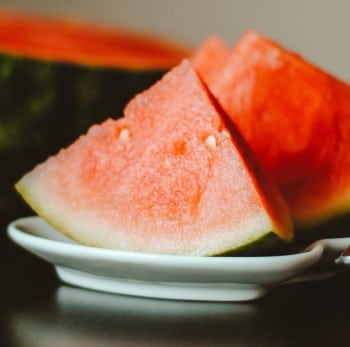
Natural diuretics
Anything with a high water content can keep you up longer that you want making bathroom visits.

High fat and protein
That slice of pizza seemed like a good idea. Unfortunately, fatty protein-rich snacks take longer to digest. The fat can also cause the buildup of stomach acid.

Aged, cured, fermented, and smoked foods
These foods are loaded with tyramine, a byproduct of the breakdown of the amino acid tyrosine. It can trigger increased brain activity and delay sleep.
Sleep friendly snacks for when you’re too hungry to sleep
Okay, now that you know what to stay away from, lets get to the good stuff – light, healthy snacks for those nights when you’re too hungry to sleep.
The basic rule is when you snack choose foods that are sleep-friendly, something that won’t make it harder to fall asleep and stay asleep.
It turns out that many of the healthy foods options may also help you transition to sleep. They contain nutrients that promote sleep.
The nutrients to look for include:
Melatonin Rich Foods – Melatonin is the hormone that tells your body it’s time to sleep
Tryptophan Rich Foods – Dietary tryptophan intake has been linked to sleep duration and tryptophan supplementation has been found to improve sleep.
Calcium Rich Foods – Calcium intake has been associated with poor sleep. Calcium rich diets have been shown to help patients with insomnia.
Magnesium Rich Foods – Important for sleep and acts as a natural relaxant to help deactivate adrenaline. In a 2012 clinical study, magnesium supplementation was found to improve sleep.
Vitamin B Rich Foods – Deficiencies in vitamin B-6 have been linked to depression and poor sleep.
Another thing dieticians often recommend is lean protein and foods high in fiber. They can help you feel more full.
So, let’s look at some healthy snacks worth a try.
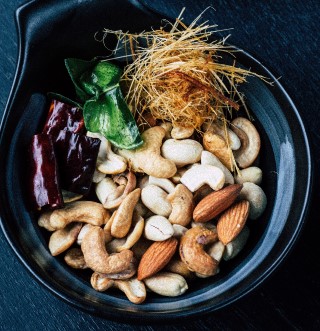
1) Mixed Nuts
Nutrients: vitamin B, protein
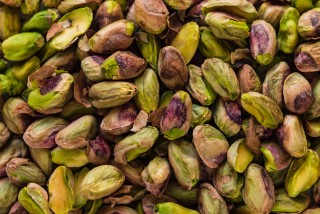
2) Pistachios
Nutrients: vitamin B, protein
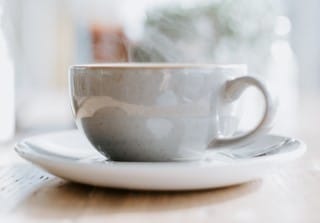
3) Warm Milk
Nutrients: calcium, tryptophan, protein
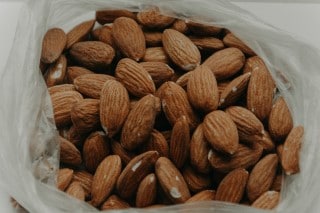
4) Almonds or Almond milk
Nutrients: melatonin, protein
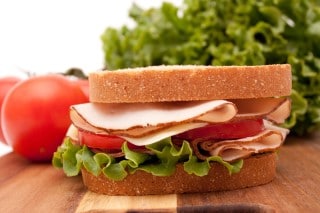
5) Lean turkey
Nutrients: tryptophan, protein
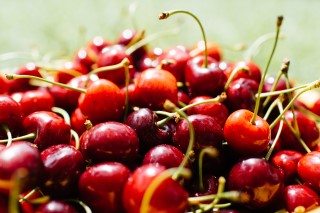
6) Tart Cherries or Cherry Juice
Nutrients: melatonin
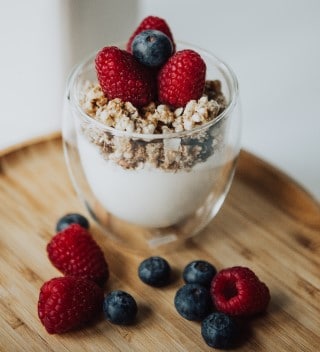
7) Yogurt with fruit and honey
Nutrients: calcium, magnesium, tryptophan, vitamin B, protein
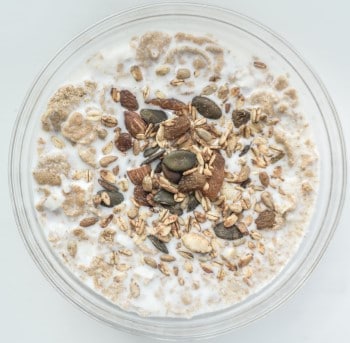
8) Oatmeal with low fat milk
Nutrients: melatonin, calcium, tryptophan, protein
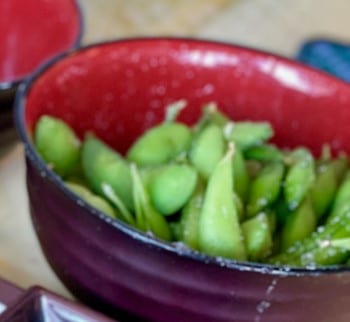
9) Edamame, lightly sprinkled with salt and pepper
Nutrients: protein, tryptophan
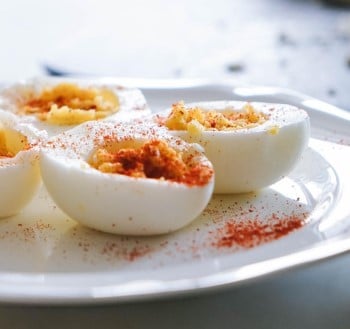
10) Hard boiled eggs
Nutrients: protein, tryptophan
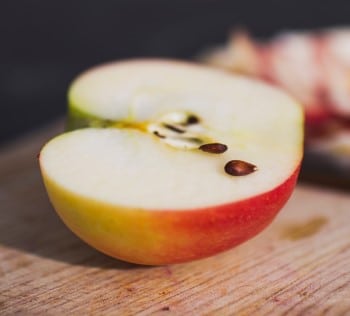
11) Sliced apple with peanut butter
Nutrients: protein, calcium, magnesium, Vitamin B
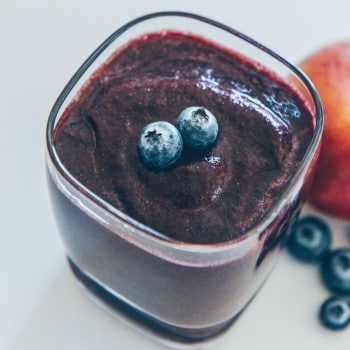
12) Fruit yogurt smoothy
Nutrients: calcium, magnesium, tryptophan, vitamin B, protein
What to do to avoid too hungry to sleep troubles
Now that you know what you can snack on if you’re too hungry to sleep, let’s look at what you really should be doing so that you stay out of trouble.
You need to have good habits surrounding food and sleep. It’s also important to deal with any underlying causes.
Some things to think about:
1) Eating a balanced healthy dinner
This one is pretty obvious. Avoid the bad stuff that can come back to bite you, eat more of the good stuff. Again, don’t forget to include some healthy protein and fiber.
2) Making lifestyle changes
If your missing meals, take an honest look at why it’s happening. Don’t have time to cook? Try preparing your dinners ahead of time.
Too busy with work or other activities? Try restructuring your schedule and commitments so that you have time for meals.
Always on the go? Bring your healthy snacks and dinner with you.
3) Don’t feel like eating…why?
Have you been feeling a bit down lately? It’s not uncommon for people dealing with anxiety or depression to lose interest in eating.
If you find that you’re really struggling with things, keep in mind that you’re not alone. You can also chat with a doctor or a mental health professional.
4) Sleep hygiene
Sometimes people stay up too late and get hungry. Other times they wake up, have a hard time falling back to sleep, and then get hungry.
You want to avoid anything that can make things worse when your too hungry to sleep. Unfortunately, there are lots of things that can affect sleep.
That’s why you need to practice good sleep hygiene.
The rules to follow are:
- keep regular wake up and sleep times
- avoid naps
- exercise during the day
- avoid large meals, alcohol, or stimulants such as caffeine before bedtime
- maintain a bedtime routine that prepares you for sleep
- keep your bedroom quiet, dark, and cool
- avoid electronics use in the bedroom
5) Getting a checkup
While this may not be directly related to hunger, it’s worth considering, especially if you’ve been sleeping poorly for extended periods.
Other health issues can cause or worsen sleep issues. Heart burn is pretty obvious, but things like chronic pain, asthma, and cancer have been linked to insomnia.
Anxiety and depression are linked to poor sleep. You may also be living with an undiagnosed disorder such as sleep apnea.
Sources:
1. “Talking Points”, World Sleep Society website
2. “Feeling Hangry? It’s Not Just Because You’re Extremely Hungry”, Healthline.com
3. “Eating well to help manage anxiety: Your questions answered”, 2018, Harvard Health Publishing
4. “Sweet Dreams: How Sugar Impacts Your Sleep”, Sleep.org
5. Tryptophan Intake in the US Adult Population Is Not Related to Liver or Kidney Function but Is Associated with Depression and Sleep Outcomes. J Nutr. 2016 Dec;146(12):2609S-2615S.
6. Sleep Symptoms Associated with Intake of Specific Dietary Nutrients, J Sleep Res. 2014, 23(1): 22–34.
7. The effect of magnesium supplementation on primary insomnia in elderly: A double-blind placebo-controlled clinical trial, J Res Med Sci. 2012, 17(12):1161-9.
8. Comparison of nutrient intake by sleep status in selected adults in Mysore, India. Nutr Res Pract. 2011 Jun;5(3):230-5.
9. “5 Tips to Curb Your Late-Night Snacking”, 2020, Academy of Nutrition and Dietetics website
10. “What Is Depression?”, American Psychiatric Association website
Connect with us:
About Us
Better Sleep Simplified® was founded as a place for you to get clear and well-researched information.
Our goal is to make sure you know about your options so that you take action sooner rather than later.
Check us out on YouTube:
Watch and Learn
Helpful sleep tips, interesting sleep facts and statistics you want to know about
Affiliate Disclosure
This site is a participant in the Amazon Services LLC Associates Program and other affiliate advertising programs designed to provide a means for sites to earn advertising fees by advertising and linking to them.
Important: BetterSleepSimplified.com is for informational purposes only and is not intended or implied to be a substitute for professional medical advice, diagnosis, or treatment. Always consult a physician for sleep and health concerns. See additional information.
